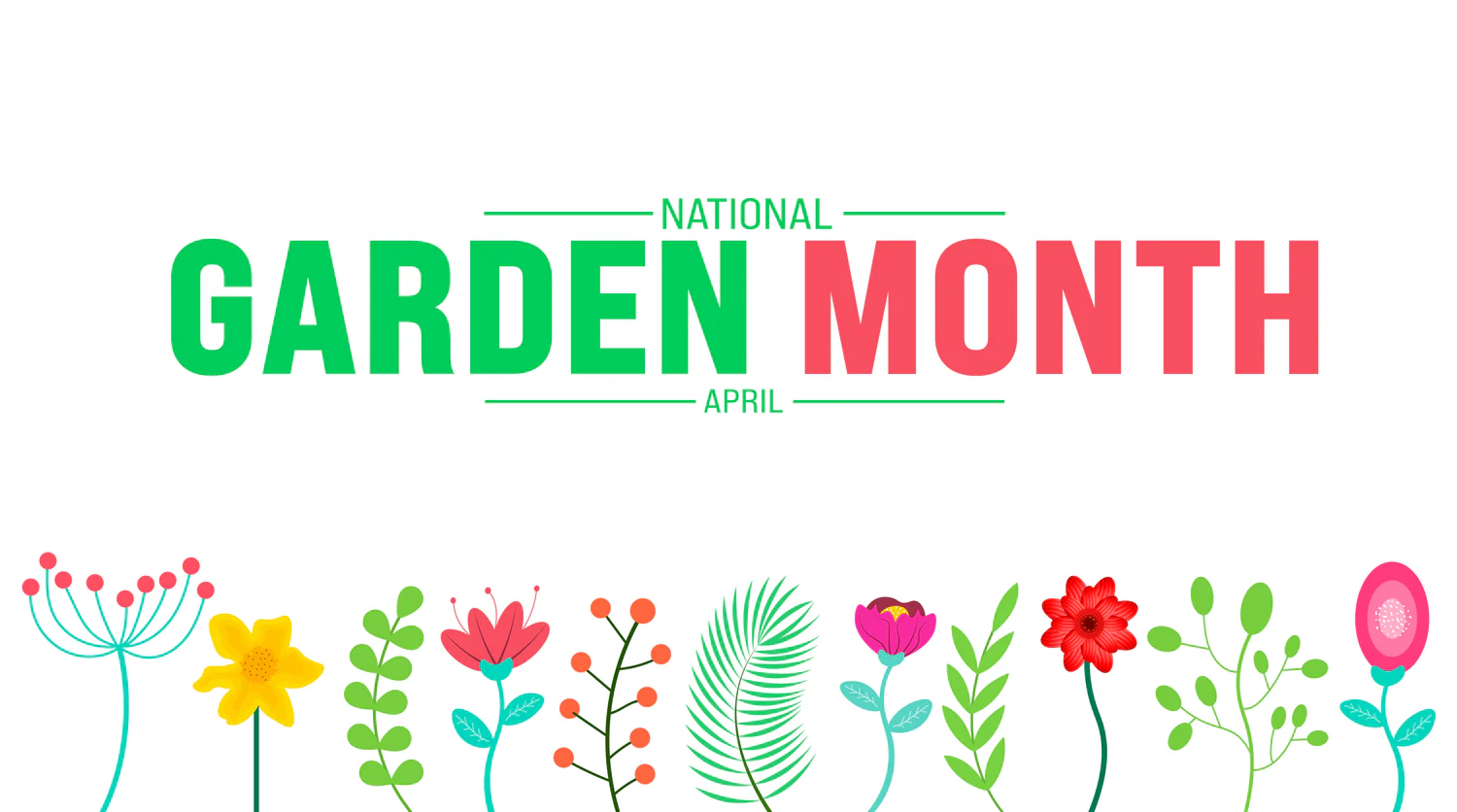National Garden Month 2024: Celebrating the Beauty and Abundance of Gardens
April showers bring May flowers, and May brings National Garden Month – a month-long celebration of the beauty, bounty, and benefits of gardens across the United States. From backyard vegetable patches to grand botanical gardens, gardening is a beloved pastime that brings people together, connects us with nature, and nourishes our bodies and souls.
As we welcome the warmth of spring and the vibrant blooms that come with it, National Garden Month 2024 is the perfect opportunity to appreciate the hard work of gardeners, learn about the latest trends and techniques, and get inspired to start or expand your own garden.

The History of National Garden Month
The origins of National Garden Month can be traced back to the late 1980s when the National Gardening Association (NGA) recognized the need to promote gardening as a valuable and rewarding activity. In 1987, the NGA designated April as National Garden Month, aiming to raise awareness about the benefits of gardening and encourage more people to take up this therapeutic and sustainable hobby.
Over the years, National Garden Month has grown into a nationwide celebration, with events, workshops, and activities organized by gardening clubs, botanical gardens, community organizations, and horticultural societies across the country.
Latest Research in Gardening
Recent studies have shown that being around plants and the natural world, especially through gardening, is good for both our minds and bodies. A study by the University of Florida found that gardening activities lowered stress, anxiety, and depression in healthy women who attended twice-weekly gardening classes, even if they had never gardened before[1]. The study demonstrated evidence of the dosage effects of gardening, showing how much gardening someone has to do to see improvements in mental health.
Gardening is helpful not just for individuals, but entire communities as well. A survey conducted by Mind, a UK mental health charity, found that over 7 million people in one country have taken up gardening since the start of the pandemic, and many said it made them feel calmer and happier[2]. Gardening can also help make sure mental and physical health problems are treated equally. It has particularly aided former members of the military.
In addition to mental benefits, gardening also counters air pollution and climate change by trapping carbon and releasing oxygen. It reduces noise, heat, glare, wind, erosion, and dust. Plants can solve the problem of polluted land from industry too.
Doctors are advised to suggest gardening as a therapeutic activity since being around nature improves health[1][2]. Hospitals, hospice care centers, schools, and prisons could have gardens to help prevent illness and relieve conditions in their populations.
In summary, recent research shows the mental and physical health advantages of exposure to plants and nature, especially through gardening. It can boost individual and group mental health, fight pollution and climate change, and make sure mental and physical disabilities receive equal treatment. Doctors should recommend gardening activities to aid their patients’ well-being.
The Benefits of Gardening
Gardening is more than just a hobby; it’s a lifestyle that offers numerous physical, mental, and emotional benefits. Here are some of the most notable advantages of gardening[4]:
- Improved Physical Health: Gardening is an excellent form of low-impact exercise that can improve flexibility, strength, and endurance. It also promotes better sleep and can reduce the risk of chronic diseases such as obesity, heart disease, and diabetes.
- Mental Well-being: Spending time in nature and engaging in gardening activities has been proven to reduce stress, anxiety, and depression. The act of nurturing plants and watching them grow can be incredibly therapeutic and grounding.
- Environmental Sustainability: Gardening promotes eco-friendly practices such as composting, water conservation, and the cultivation of native plants, which in turn supports biodiversity and reduces our carbon footprint.
- Food Security: Growing your own fruits, vegetables, and herbs ensures access to fresh, nutritious produce while reducing your reliance on commercially grown foods, which often travel long distances and contribute to greenhouse gas emissions.
- Community Building: Gardening brings people together, fostering a sense of community and connection. Community gardens, in particular, provide opportunities for social interaction, knowledge-sharing, and collective efforts towards a common goal.

Gardening Trends for 2024
As gardening continues to gain popularity, new trends and innovations emerge each year. Here are some of the most exciting gardening trends to watch out for in 2024[5][6]:
- Sustainability and Eco-Friendly Practices: With increasing awareness of environmental issues, sustainable gardening practices such as rainwater harvesting, composting, and integrated pest management are becoming more prevalent. Gardeners are also embracing the use of recycled and repurposed materials in their gardens.
- Urban Gardening: As urban areas continue to densify, innovative solutions for gardening in small spaces are on the rise. Vertical gardening, rooftop gardens, and container gardening are becoming increasingly popular, allowing city dwellers to grow their own fresh produce and enjoy the benefits of gardening.
- Native Plant Gardening: There is a growing movement towards incorporating native plants into gardens, as they are better adapted to local conditions and provide valuable habitats for pollinators and other wildlife. Native plant gardens not only promote biodiversity but also require less water and maintenance.
- Edible Landscaping: Combining ornamental plants with edible crops is a trend that is gaining traction. Edible landscaping allows gardeners to create beautiful and productive spaces, blurring the lines between traditional landscaping and vegetable gardening.
- Technology in Gardening: From smart irrigation systems to gardening apps and automated greenhouse systems, technology is playing an increasing role in making gardening more efficient and accessible. Gardeners are embracing these innovations to optimize their efforts and achieve better results.
National Garden Month Events and Activities
Throughout the month of May, gardening enthusiasts, organizations, and communities across the United States will be hosting a variety of events and activities to celebrate National Garden Month. Here are some highlights[7]:
- Garden Tours: Many botanical gardens and public gardens offer special tours, highlighting their collections and providing educational insights into plant care and garden design.
- Gardening Workshops and Classes: Local nurseries, gardening clubs, and community centers often organize workshops and classes covering various topics such as vegetable gardening, composting, pruning techniques, and more.
- Plant Sales and Swaps: These events provide opportunities for gardeners to share their extra plants, seeds, and gardening supplies, promoting sustainability and community building.
- Garden Festivals and Fairs: Larger-scale events featuring live music, food vendors, gardening demonstrations, and educational exhibits offer a fun and engaging way to celebrate gardening.
- Community Garden Events: Many community gardens host open houses, work days, and educational events to encourage participation and promote the benefits of collective gardening efforts.
Getting Involved in National Garden Month
Whether you’re a seasoned gardener or just starting out, there are plenty of ways to get involved in National Garden Month and celebrate the joys of gardening. Here are some ideas to consider[8]:
- Start a Garden: If you don’t already have one, use National Garden Month as motivation to start your own garden. It can be as small as a few potted plants or as large as a backyard vegetable patch.
- Attend Local Events: Check your local community calendars and event listings for gardening-related activities happening near you. Participating in these events is a great way to learn, connect with fellow gardeners, and support your local gardening community.
- Share Your Passion: If you’re an experienced gardener, consider volunteering to teach a workshop or lead a garden tour. Sharing your knowledge and passion can inspire others to take up gardening or improve their skills.
- Join a Garden Club: Garden clubs are fantastic resources for connecting with like-minded individuals, exchanging tips and advice, and participating in community gardening projects.
- Support Local Nurseries: Visit your local nurseries and garden centers during National Garden Month to purchase plants, seeds, and gardening supplies. This not only supports local businesses but also encourages sustainable gardening practices.

Conclusion
National Garden Month is a time to celebrate the beauty, abundance, and benefits of gardens while fostering a deeper appreciation for the art and science of gardening. Whether you’re an experienced green thumb or a novice gardener, this month-long celebration offers endless opportunities to learn, connect, and participate in this rewarding and sustainable hobby.
As we embrace the warmer weather and longer days, let’s take a moment to appreciate the hard work of gardeners, both seasoned and new, who contribute to the vibrant landscapes and bountiful harvests that enrich our communities. By nurturing our gardens, we nurture ourselves, our neighborhoods, and our planet.
So, grab your gardening gloves, a trowel, and a sense of adventure, and join the celebration of National Garden Month 2024. Whether you’re planting a small herb garden on your windowsill or tending to a lush backyard oasis, every garden matters and every gardener plays a vital role in creating a more beautiful, sustainable, and nourishing world.
References:
[1] Thompson, Richard. “Gardening for health: a regular dose of gardening.” Clinical medicine (London, England) vol. 18,3 (2018): 201-205. doi:10.7861/clinmedicine.18-3-201
[2] “Over 7 Million Have Taken up Gardening since the Pandemic: New Research Shows Spending More Time in Nature Has Boosted Nation’s Wellbeing.” Mind.org.uk, 2022, www.mind.org.uk/news-campaigns/news/over-7-million-have-taken-up-gardening-since-the-pan demic-new-research-shows-spending-more-time-in-nature-has-boosted-nation-s-wellbeing/
[3] diane. “April Is National Garden Month!” National Garden Bureau, 3 Apr. 2024, ngb.org/april-is-national-garden-month/.
[4] Soga, Masashi et al. “Gardening is beneficial for health: A meta-analysis.” Preventive medicine reports vol. 5 92-99. 14 Nov. 2016, doi:10.1016/j.pmedr.2016.11.007
[5] “PHS’s Top 10 Gardening Trends for 2024.” Phsonline.org, 2024,
phsonline.org/for-gardeners/gardeners-blog/top-10-gardening-trends-for-2024.
[6] Orlóci, László, and Albert Fekete. “Ornamental Plants and Urban Gardening.” Plants (Basel, Switzerland) vol. 12,24 4096. 7 Dec. 2023, doi:10.3390/plants12244096
[7] “Get out and Garden for National Garden Month | Natural Resources Conservation Service.” Natural Resources Conservation Service, 12 Apr. 2023,
[8] “April Is National Gardening Month: Get out and Grow (David Trinklein).” Missouri.edu, 2020, ipm.missouri.edu/MEG/2020/4/gardeningMonth-DT/.







